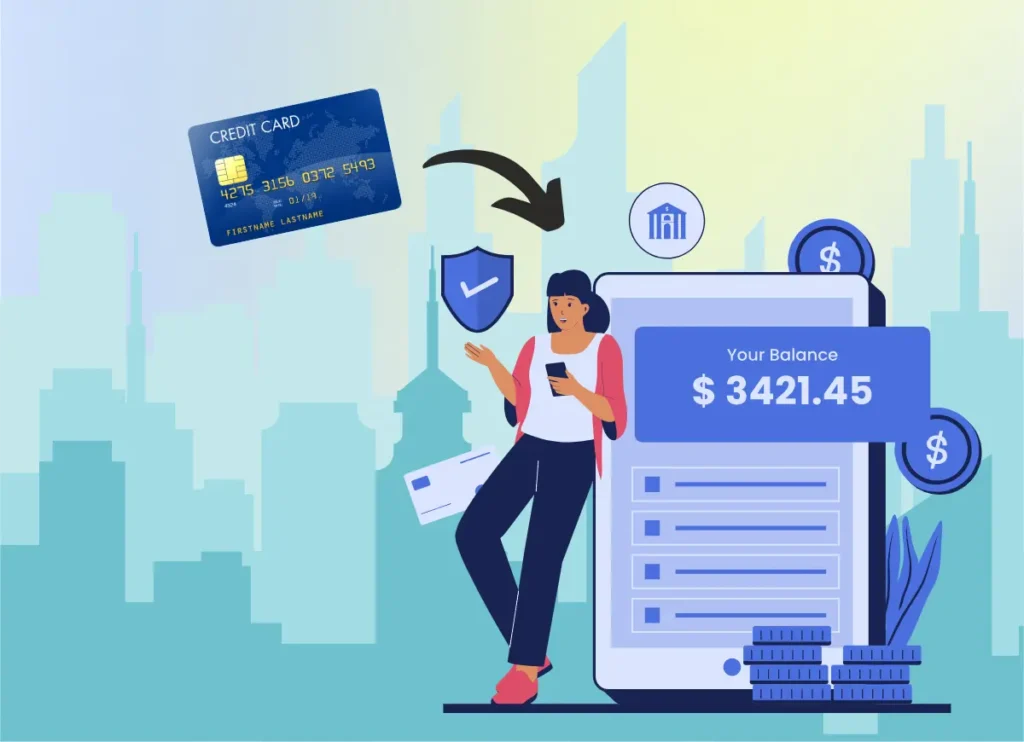I have seen many people in banks struggling with urgent cash needs. They don’t want to take personal loans due to lengthy approval processes and high EMIs. However, they do have credit cards with available limits. The problem? If they withdraw cash directly from the ATM or take a loan on a credit card, they end up paying a hefty interest rate, often between 15% to 30%.
This situation leaves them searching for smarter ways to transfer money from their credit card to a bank account with minimal fees. If you’re facing a similar problem, here are 10 effective ways to do it.

Table of Contents
1. Bank Transfer via Credit Card
Some banks allow direct transfers from a credit card to a bank account. This option is available in net banking and mobile banking apps. However, it often comes with a transaction fee (1-3%) and interest charges starting immediately.
- Pros: Instant transfer with minimal effort, making it a quick solution for urgent cash needs. Suitable for those who have access to bank-integrated credit card services.
- Cons: High transaction fees and immediate interest charges make it one of the most expensive methods of fund transfer.
2. Using Payment Apps (Paytm, Google Pay, PhonePe, Venmo, etc.)
Many digital payment apps allow you to add money from a credit card and then transfer it to your bank account. However, most apps charge a processing fee of 2-5% on such transactions.
- Pros: Fast and convenient.
- Cons: High service charges.
3. Using Wallets (PayPal, Skrill, Neteller, etc.)
You can load money into an online wallet using your credit card and withdraw it to your linked bank account. These services are useful for international transactions as well.
- Pros: International transfers available.
- Cons: Fees vary depending on the wallet.
4. Money Transfer Services (Western Union, MoneyGram, Remitly, etc.)
These services allow you to transfer money from a credit card to a recipient’s bank account, including your own. They are mostly used for cross-border transactions.
- Pros: Good for international transfers.
- Cons: Higher exchange rates and service fees.
5. Cash Advance from ATM and Deposit to Bank Account
Credit cardholders can withdraw cash from an ATM and deposit it into their bank account. However, this method comes with high cash advance fees and interest.
- Pros: Immediate cash access.
- Cons: Very high interest rates (up to 36% annually).
6. Balance Transfer to a Bank Account
Some banks offer balance transfer options, where you can transfer your credit card balance to your bank account with a lower interest rate for a limited period.
- Pros: Lower interest compared to cash advances.
- Cons: Not all banks offer this service.
Lesser-Known or Newer Methods
7. Using Stock Trading Apps (NEW)
Some trading platforms like Zerodha, Upstox, Robinhood, and eToro allow users to add funds via a credit card. You can buy and sell stocks quickly and then withdraw the amount to your bank account.
- Pros: Potential for profit.
- Cons: Withdrawal processing times vary.
8. Pay Utility Bills for Someone and Receive Bank Transfer (NEW)
If you have a trusted friend or family member, you can pay their electricity, gas, or rent bills using your credit card. In return, they transfer the equivalent amount to your bank account.
- Pros: No service charges.
- Cons: Requires a trusted person.
9. Buying Gift Cards and Reselling for Cash (NEW)
You can buy gift cards from Amazon, Flipkart, Google Play etc. using your credit card and then resell them at a small discount for cash.
- Pros: Safe and effective.
- Cons: Selling might take time.
10. Crypto Method (NEW but Risky)
You can buy cryptocurrency like Bitcoin or USDT using a credit card on exchanges like Binance or Coinbase, then sell it for cash and withdraw to your bank.
- Pros: Global availability.
- Cons: Crypto price fluctuations and exchange fees.
Things to Consider Before Transferring Money from a Credit Card to a Bank Account
- Check the Fees: Most methods charge 2-5% per transaction. Always review the applicable charges before initiating a transfer.
- Understand Interest Rates: Credit card cash advances come with high interest, sometimes up to 36% annually, and interest starts accruing immediately.
- Be Aware of Credit Score Impact: Frequent or high-amount transfers increase credit utilization, which can lower your credit score.
- Legality and Compliance: Ensure that the method you choose is legally permitted by your bank and financial institution, as some transfers may violate terms of service.
- Processing Time: Some methods, such as bank transfers and digital wallets, may be instant, while others, like stock trading apps and crypto conversions, could take 1-3 business days.
- Tax and Scrutiny Risks: Large transactions may trigger tax implications or anti-money laundering checks by financial institutions.
- Alternative Options: Consider alternatives like balance transfers or paying bills for someone to minimize costs instead of opting for high-fee transfers.
- Security Risks: Using third-party services or crypto exchanges comes with hacking and fraud risks, so always verify the platform’s reliability.
- Repayment Planning: Ensure you can repay the amount on time to avoid hefty interest charges and penalties on your credit card balance.
Conclusion: Choose Wisely
Now that you know the different ways to transfer money from a credit card to a bank account, as a banker i can advice you to choose the one that suits you best. If you need an instant and easy transfer, digital wallets or direct bank transfers work well but come with fees.
If you want a smarter way with lower costs, paying utility bills, using stock trading apps, or reselling gift cards can be good alternatives. Whatever method you choose, always be mindful of the charges and repayment timelines to avoid unnecessary financial burdens.
Frequently Asked Questions (FAQ)
Will transferring money from a credit card to a bank account affect my credit score?
Yes, frequent transfers and high credit utilization can negatively impact your credit score, especially if you delay repayments.
Can I avoid fees when transferring money from my credit card?
Some methods like paying utility bills for someone in exchange for a bank transfer may avoid extra charges, but most direct transfers come with fees.
Are there any tax implications for credit card to bank transfers?
If the amount is significant, banks may flag it, and in some countries, such transfers may be subject to scrutiny for tax or anti-money laundering regulations.
How long does it take to transfer money from a credit card to a bank account?
It depends on the method, direct transfers can be instant, while wallets and stock trading apps may take 1-3 business days.
What is the cheapest way to transfer money from a credit card to a bank account?
Alternative methods like paying someone’s bills or reselling gift cards can help avoid excessive fees compared to direct transfers.


